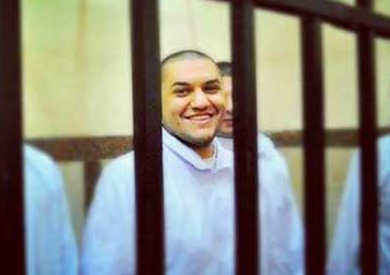Freedom for Omar Hazeq
by Hamdy El-Gazzar / May 5, 2014 / No comments
A revolutionary writer is imprisoned and dismissed from his position at the Alexandria Library.
Dozens of Egyptian writers, intellectuals, academics, and journalists have recently issued a statement calling for the retrial of the poet and novelist Omar Hazeq. An employee at the Library of Alexandria, Hazeq was sentenced to two years’ imprisonment for breaking demonstration laws and taking part in a protest during the trial of police personnel charged with the manslaughter of Khalid Said, an icon of the Egyptian Revolution. In addition to the prison sentence, Hazeq was dismissed from his position at the Library of Alexandria. In the statement written on his behalf, the signatories declared their intention to boycott all activities, events, and conventions organized by the Library of Alexandria.

- “From Egypt” attempts to draw a cultural map of Egypt and the Arab world by profiling the artistic, literary, and political issues that affect the region via on-the-ground coverage of current events, publications, and the fight for freedom of expression.

- Hamdy El-Gazzar is an Egyptian writer and one of the 39 young Arab writers included in the Beirut 39 Project. His first novel, Sihr Aswad (Dar Merit, 2005) won the prestigious Sawaris Award, and was subsequently translated by Humphrey Davies (Black Magic, AUC Press, 2007). His second novel, Ladhdhat Sirriyya (Secret Pleasures) was published by Dar al-Dar in 2008. He is currently working on a third novel.
The statement explains that, “On December 2, 2013 the poet Omar Hazeq was involved in a protest during the trial of Khalid Said’s murderers. If it wasn’t for Khalid Said, then Mubarak would still be President, el-Adly executioner, Tantawi Minister of Defence, and Al-Sisi Director of Military Intelligence. If Mubarak had survived the ‘Friday of Anger’ on January 28, 2011, Ismail Serag El-Din, the library [of Alexandria]’s Director, would have held a series of seminars and conferences about the President’s reign and his ability to navigate the crisis and eliminate the chaos that threatened the future of Egypt!”
Following this, the writers add, “The people’s will was for Mubarak to fail the test and be removed. The January 25th Revolution succeeded in the interim but failed on the subject of freedom, which was one of its emblems. This is evinced by the two-year prison sentence given to the poet Omar Hazeq, while those who murdered the January 25th revolutionaries are free. The Library of Alexandria, instead of standing by the poet, hastened to claim its innocence, complimented those who legislated the demonstration laws in the absence of parliament, then dismissed the poet.” The writers continue, “The signatories of this statement, in addition to requesting a retrial illustrating their confidence in the innocence of Omar Hazeq and his companions, condemn Ismail Serag El-Din’s oppressive stance and request a boycott of the library’s activities.”
Moreover, the Independent Workers’ Union at the Library of Alexandria, in a statement issued on April 23, denounced the library management’s oppressive decision against Hazeq. The management’s decision was based on the judgment issued against him in accordance with the laws on demonstrations, which many intellectuals are calling to be cancelled, or at least amended. In its statement, the Union said Hazeq’s dismissal was oppressive because it contravened the labour regulations of the Alexandria Library, which, as specified in Article (44) pertain to reasons for terminating employment. Nine reasons are given in this article, but the reason under Section 8 is “Judgement against the employee for a criminal offense, or for being incarcerated due to a misdemeanor involving moral turpitude or a breach of trust, even if rehabilitated.”
The Union’s statement points out, “Omar Hazeq’s case is not a criminal one, according to the case memorandum, which stated firstly: ‘The exclusion of any suspicion of a crime being committed.’ Secondly: ‘It being registered as a misdemeanor…’ this is in addition to the case not being one concerning moral turpitude, for [moral] crimes like these, even if not comprehensively defined in the penal code, are frequently defined as crimes stemming from a weakness in character, from being a deviant type of person, or from misconduct that involves moral turpitude and a lack of trustworthiness. It is without a doubt that Omar Hazeq, during the entire period of his employment at the library, conducted himself well and showed good moral character. Therefore, in accordance with the labour regulations, the termination of his employment is not permitted. The management of the library resorted to utilizing the regulations to serve its purpose, which was to terminate his employment, and pointed to the reason for its decision being that the actions Hazeq was prosecuted for were actions that threaten the internal security of the state.”
The statement also confirms that the accusation is inherently void and corrupt because Hazeq, according to the official papers, was not being judged before the state security courts, but before the court of misdemeanors. Therefore, it is for the management of the library to produce official documents proving that the case in which Hazeq and his companions were tried was one concerning state security, which they cannot.
Finally, the statement raised the question of why the revolution’s youth are judged with urgency, and imprisoned and terminated from their employment, effectively destroying their futures, while the adults aren’t judged and maintain their positions, squatting on the chests of the youth—the youth of the people and the institutions.
Freedom for Omar Hazeq, for Karam Saber, and for creativity in Egypt.





